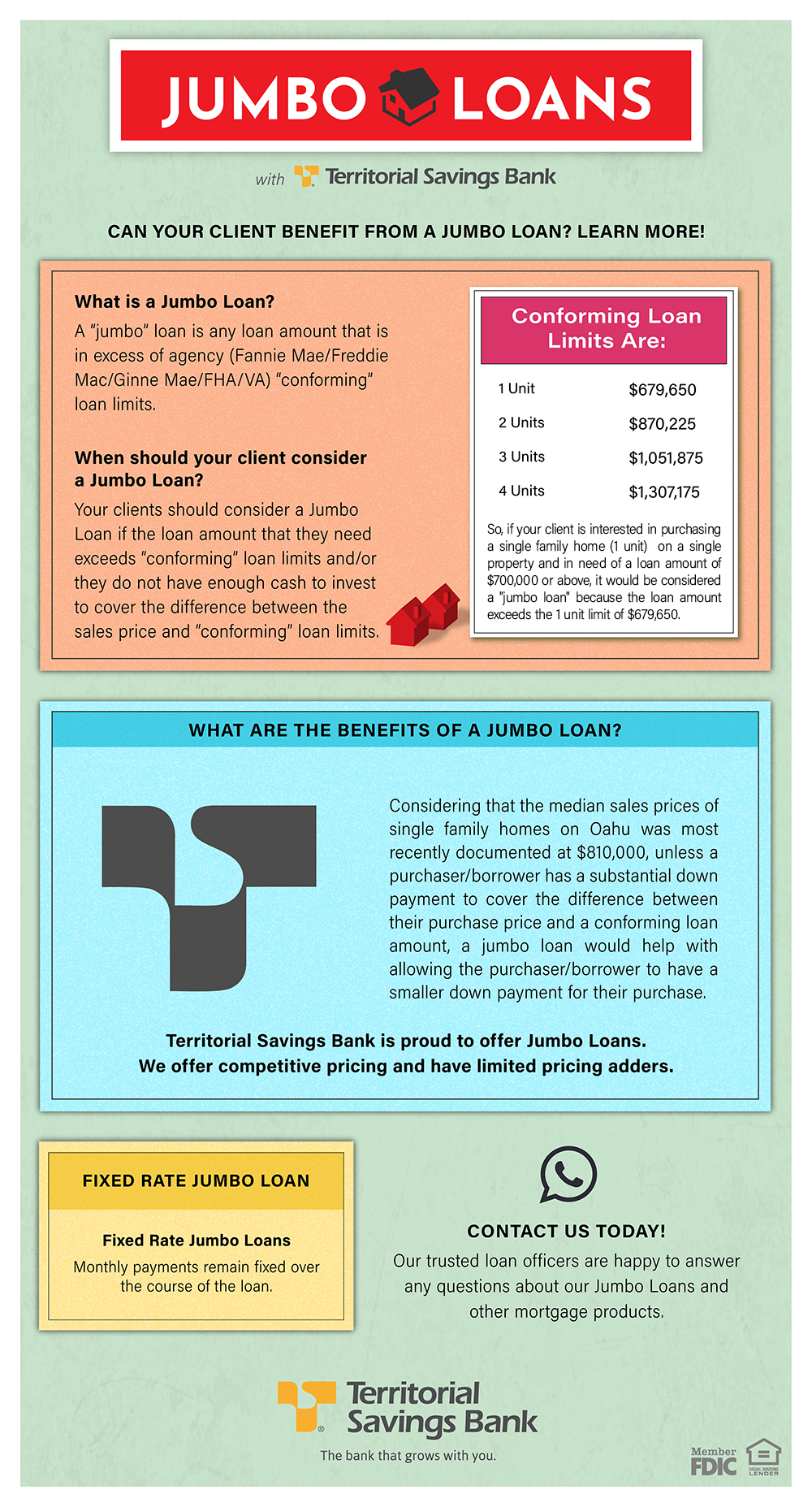Jumbo Loan: Tailored Home Loan Solutions for High-Income Debtors
Jumbo Loan: Tailored Home Loan Solutions for High-Income Debtors
Blog Article
The Effect of Jumbo Lendings on Your Financing Alternatives: What You Required to Know Before Applying
Jumbo finances can play a pivotal role in shaping your financing choices, specifically when it involves getting high-value residential properties. While they give the opportunity for bigger car loan quantities without the worry of private mortgage insurance (PMI), they also come with strict certification requirements that need cautious consideration. Understanding the balance between the obstacles and advantages postured by these fundings is essential for prospective borrowers. As you consider your alternatives, the ramifications of rate of interest and product schedule may trigger you to reassess your economic approach relocating forward (jumbo loan).
Comprehending Jumbo Lendings
Recognizing Jumbo Loans needs a clear grasp of their one-of-a-kind attributes and requirements. Jumbo fundings are a kind of mortgage that goes beyond the adhering car loan restrictions developed by the Federal Housing Finance Firm (FHFA) These limitations vary by area but usually cap at $647,200 in many locations, making jumbo car loans essential for financing higher-priced properties.
Among the defining features of big car loans is that they are not eligible for acquisition by Fannie Mae or Freddie Mac, which causes stricter underwriting standards. Customers have to usually demonstrate a higher credit rating, generally above 700, and provide significant documents of income and properties. Additionally, loan providers might require a larger down settlement-- commonly 20% or even more-- to reduce danger.
Rate of interest on jumbo car loans can be a little greater than those for adjusting car loans as a result of the increased danger thought by the lender. The absence of private home loan insurance (PMI) can balance out some of these expenses. Comprehending these variables is vital for possible consumers, as they significantly influence the terms and feasibility of securing a big car loan in today's competitive genuine estate market.
Benefits of Jumbo Fundings
Jumbo finances use distinct benefits for property buyers seeking to purchase high-value properties that go beyond standard finance limitations. One of the primary advantages of big fundings is their capability to finance bigger amounts, allowing customers to get homes in costs markets without the restrictions enforced by adjusting financing limitations - jumbo loan. This flexibility makes it possible for buyers to see a broader series of residential properties that may much better fit their needs and choices
Additionally, big fundings frequently feature affordable interest prices, particularly for customers with strong credit score profiles. This can bring about considerable savings over the life of the finance, making homeownership much more budget-friendly in the lengthy run. Furthermore, big lendings can be customized to match private financial scenarios, offering different terms and amortization options that line up with the borrower's goals.

Obstacles of Jumbo Loans
Navigating the intricacies of big finances provides several obstacles that prospective customers ought to be aware of prior to continuing. One significant hurdle is the rigorous loaning criteria enforced by banks. Unlike adhering financings, big car loans are not backed by government-sponsored enterprises, leading lending institutions to take on even more rigorous criteria. This commonly includes greater credit report needs and considerable documentation to validate earnings and assets (jumbo loan).
Furthermore, jumbo loans normally feature greater rates of interest contrasted to standard car loans. This elevated cost can substantially influence month-to-month payments and overall affordability, making it vital for debtors to carefully assess their monetary circumstance. Additionally, the down settlement needs for big financings can be substantial, often ranging from 10% to 20% or more, which can be an obstacle for many prospective property owners.
An additional challenge depends on the minimal availability of big loan products, as not all loan providers Discover More Here supply them. This can result in a minimized swimming pool of alternatives, making it essential for debtors to perform comprehensive research study and possibly seek specialized lenders. In general, recognizing these obstacles is essential for anyone thinking about a big finance, as it ensures educated decision-making and far better economic planning.
Qualification Criteria
For those thinking about a jumbo funding, fulfilling the credentials criteria is an essential step in the application process. Unlike traditional fundings, big fundings are not backed by federal government companies, leading to more stringent demands.
To start with, a strong credit rating is necessary; most loan providers call for a minimum score of 700. Additionally, borrowers are normally anticipated to demonstrate a substantial revenue to ensure they can pleasantly manage higher regular monthly payments.
Down settlement requirements for big fundings are additionally index substantial. Debtors need to anticipate putting down at the very least 20% of the home's acquisition price, although some loan providers might provide choices as reduced as 10%. Additionally, demonstrating cash money reserves is essential; lending institutions usually need evidence of sufficient liquid properties to cover a number of months' worth of mortgage settlements.
Contrasting Funding Alternatives
When assessing financing options for high-value residential properties, comprehending the distinctions between numerous finance types is crucial. Big lendings, which go beyond adjusting loan limitations, usually come with stricter qualifications and greater rates of interest than standard loans. These finances are not backed by government-sponsored business, which increases the lender's danger and can lead to more stringent underwriting requirements.
On the other hand, standard loans offer more versatility and are frequently less complicated to get for borrowers with strong credit score accounts. They may come with lower interest prices and a broader variety of alternatives, such as fixed or adjustable-rate mortgages. In addition, government-backed finances, like FHA or VA financings, supply opportunities for reduced down settlements and more lax credit score demands, though they also impose restrictions on the lending quantities.

Verdict
To conclude, jumbo loans present both chances and challenges for possible buyers seeking financing for high-value residential or commercial properties. While these car loans enable for larger quantities without the worry of personal mortgage insurance policy, they come with stringent qualification requirements and prospective downsides such as higher rate of interest. A thorough understanding of the challenges and advantages related to jumbo fundings is vital for making informed choices that straighten with long-term economic objectives and goals in the genuine estate market.

Report this page